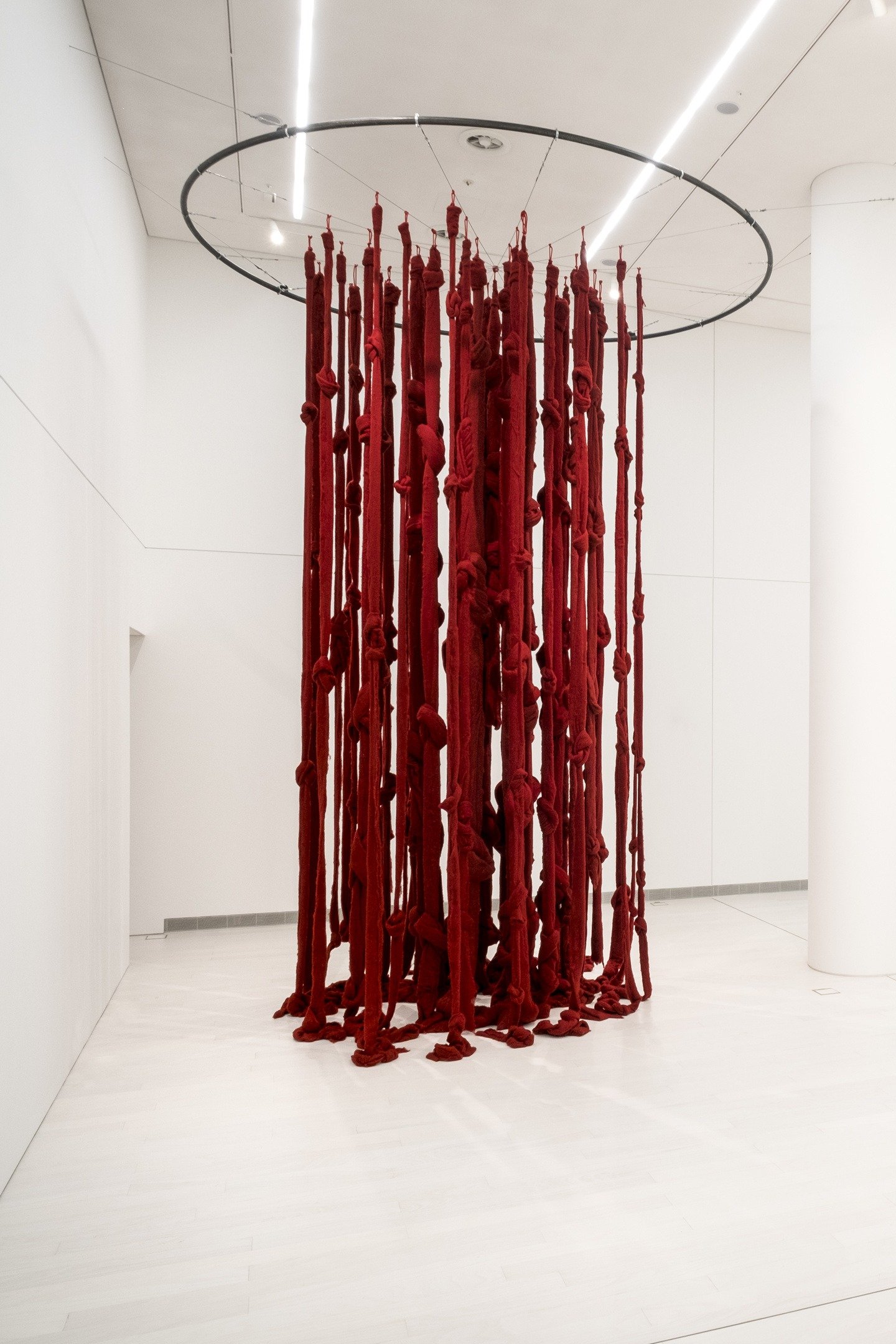Just some wild berries outside my house in October of 2014.
The future of knowledge
by Sarah Firisen
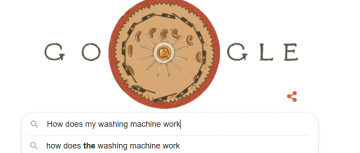 This morning I rode an Uber to JFK from my apartment in Queens. I do this regularly and normally don’t worry too much about it, but this morning, there was just something about the driver that concerned me, though I couldn’t put my finger on what. But every time his, very loud, GPS gave him a direction, in a language I couldn’t pin down, I just had this sense that he truly had no idea where he was going. And in case you’re not familiar with NYC, if you drive a car for a living, you’ve probably driven from the city to JFK more than a few times and do know where you’re going. Anyway, we arrived at JFK, I reminded him I wanted terminal 2 and I thought, “I guess my worries were for nothing”. And almost as soon as I thought that, he missed the sign for terminal 2. I mean, I guess it can happen, but it’s never happened to me before in all my many years of flying out of that airport. The signs don’t exactly creep up on you. I tell him he’s missed it; we start on a loop back around the airport and I say, “the green sign’s for terminal 2”, then he misses it again. And it turns out, the reason he kept missing it was because his GPS was telling him something contrary. I pointed out to him that I hadn’t put terminal 2 in Uber, so how would its GPS know that? The third time around the airport, I rather lost my temper and told him to stop listening to his phone and to listen to me. And third time lucky, we reached terminal 2.
This morning I rode an Uber to JFK from my apartment in Queens. I do this regularly and normally don’t worry too much about it, but this morning, there was just something about the driver that concerned me, though I couldn’t put my finger on what. But every time his, very loud, GPS gave him a direction, in a language I couldn’t pin down, I just had this sense that he truly had no idea where he was going. And in case you’re not familiar with NYC, if you drive a car for a living, you’ve probably driven from the city to JFK more than a few times and do know where you’re going. Anyway, we arrived at JFK, I reminded him I wanted terminal 2 and I thought, “I guess my worries were for nothing”. And almost as soon as I thought that, he missed the sign for terminal 2. I mean, I guess it can happen, but it’s never happened to me before in all my many years of flying out of that airport. The signs don’t exactly creep up on you. I tell him he’s missed it; we start on a loop back around the airport and I say, “the green sign’s for terminal 2”, then he misses it again. And it turns out, the reason he kept missing it was because his GPS was telling him something contrary. I pointed out to him that I hadn’t put terminal 2 in Uber, so how would its GPS know that? The third time around the airport, I rather lost my temper and told him to stop listening to his phone and to listen to me. And third time lucky, we reached terminal 2.
On reflection, apart from thinking that maybe he couldn’t read and definitely didn’t speak great English, it occurred to me that a large part of the problem was his total and utter faith in his technology, over his own eyes and ears (as I kept yelling, “not that way!!!!”). Of course, he’s not alone. Read more »
Time travelers we are, each and all
Early in the 20th century physicists restored us to time. That’s not how the story is generally told, but it is a good way to think about it. Having been restored to time, we must now realize that we are time travelers, not just Dr. Who, and his – but I believe it is now her, no? – assistant, but all of us.
Let me explain.
* * * * *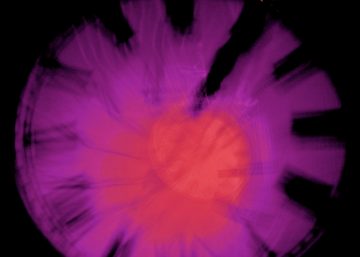
Let us begin by setting physics aside. Journey with me to a concert hall in Chicago in November of 1969. We are sitting next to Wayne Booth, a distinguished English professor at the University of Chicago who is an amateur cellist, and his wife, Phyllis. Though we do not know this, they are grieving the death of their son four months earlier as we are all listening to a performance of Beethoven’s string quartet in C-sharp minor. Here is how Booth described that performance in his book about his cello-playing, For the Love of It: Amateuring and Its Rivals:
Leaving the rest of the audience aside for a moment, there were three of us there: Beethoven… the quartet members counting as one….Phyllis and me, also counting only as one whenever we really listened …Now then: there that “one” was, but where was “there”? The C-sharp minor part of each of us was fusing in a mysterious way….[contrasting] so sharply with what many people think of as “reality.” A part of each of the “three” … becomes identical.
There is Beethoven, one hundred and forty-three years ago … writing away at the marvelous theme and variations in the fourth movement. … Here is the four-players doing the best it can to make the revolutionary welding possible. And here we am, doing the best we can to turn our “self” totally into it: all of us impersonally slogging away (these tears about my son’s death? ignore them, irrelevant) to turn ourselves into that deathless quartet.
How are we to think of this fusion Booth describes, himself with his wife, both with the four performers, and all of them, by implication, with Beethoven though the medium of his composition? What does that fusion, pushed to the limit, do with time? Is it possible, contra Heraclitus, to dip into the same stream time after time? Read more »
Monday, October 7, 2019
Trump tactics and believing what the evidence supports
by Michael Klenk

News of a whistleblower’s report recently ushered in the latest scandal surrounding Donald Trump’s US presidency. According to the whistleblower, Trump urged the Ukrainian president to investigate one of Trump’s personal political rivals, Joe Biden, after emphasising that, in the past, “the United States has been very, very good to Ukraine.” Efforts by the Democrats to impeach Trump are since underway (more here).
One of Trump’s reactions to the whistleblower’s report stood out to me because it can be used to illustrate a puzzle about rational belief formation, as I will explain after briefly introducing the case.
Trump retweeted someone’s snippet of a Fox News item, which said that the whistleblower had “political bias” against Trump. Moreover, the original tweeter emphasised that the whistleblower allegedly “supports one of [Trump’s] opponents in the 2020 race.” Trump’s retweet signals endorsement of these claims. In his tweet, Trump did not challenge the whistleblower’s claims directly. He did not, for example, provide proof that what was really said in the phone call differs from the whistleblower’s report (because it wasn’t, as a memo released by the White House later confirmed). Instead, Trump challenged the whistleblower’s claims indirectly. In what is by now a recognisable Trump tactic, he sought to win a debate by incriminating his opponents, sowing doubt about their motives and their credibility.
What should we make of such indirect attacks? Of course, we could ask whether the whistleblower, in fact, has a political bias against Trump and whether the whistleblower, in fact, supports one of Trump’s opponents. But there is a deeper worry. Why would indirect allegations about the whistleblower’s background rather than direct refutations of the whistleblower’s report matter anyhow? Read more »
On Humanity and Mathematics
by Jonathan Kujawa
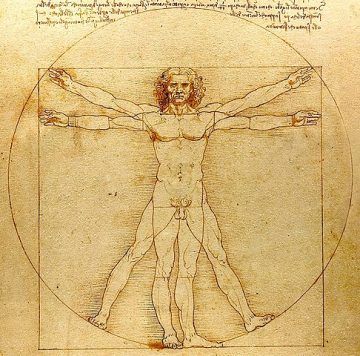
In the past few months I’ve been thinking a fair bit about math and humanity. We often think of math as outside of us but, in fact, it is a deeply human enterprise.
A group of us in the University of Oklahoma (OU) math department have been trying to establish a “bridge program” for students coming out of undergraduate but not quite ready for graduate school. In meetings with various university administrators, I’ve had to fumble my way towards an articulation of the sort of students we hope to have in the program. There are several such programs around the country with most designed to reach one or more groups that are underrepresented in mathematics. But, certainly, to have an effective program and to get administrators to open their wallets, you really need to be able to say who you’re trying to reach [1].
Oklahoma happens to be the home of Langston University, the westernmost historically black college or university (HCBU), along with a number of universities which serve sizable populations of Native Americans. The idea of a bridge program at OU came out of a thought-provoking meeting this past spring with members of the Langston math department. In that meeting we discussed ways we could partner together. A bridge program that gives Langston students the opportunity to be part of a graduate program while staying in Oklahoma would be a great start. More generally, like those other math bridge programs around the country, we would like to knock down barriers for members of under-represented groups who would like to dive more deeply into mathematics.
But as I’ve thought about it, I think it should be more than that. If I were to encapsulate our bridge program in a phrase, I would say our program should be for students who have both potential and interest in graduate school in mathematics, but not yet the requisite background. Read more »
Monday Poem
by Jim Culleny
I’ve done a number of things to make a living over the years, but my most protracted make-a-living venture has been as a carpenter. But I’ve not done that alone: without the right tools a carpenter’s as helpless as a musician without an axe. Tools are body’s extension, and mind’s. Which brings me to my other, coincidental building project, assembling songs and poems. Some time ago, bringing the two together, I began a series of short poems built upon my relationship with tools. The first four are here:
MY TOOLS
1. Adze
I’ve never been a mathematician
physicist or statistician
but, as a carpenter who aspires
to be a word magician,
I can fill you in on certain facz
such as the paradoxical condition
in which, at least from Mesolithic times,
the framer’s friend, the adze, subtracz
2. Hammer
A hammer’s not a thing of glamor
until you feel its weight,
but when you grip an Estwing’s shank
and swing it up to bring it down
to drive a nail into a plank
you recognize its simple grace:
its elegant utility as whammer
and if your nail’s a driven flaw
you always have its graceful claw’s
corrective adjunct to your
curse and stammer
3. Spirit Level
A spirit level’s used to set things straight
with the plane of the horizon as in a beam
or plumb as with a stud to make sure
structure’s right by spirit
you breathe deep and easy and hold the level
so the spirit bubble floats in the small arc of a glass flask
dead center which if placed upon a joist would say,
this floor is level
…………………..
being on the level
good way to be
4. Square
Beloved of a stairway crafter
or sawyer of a stud or joist
or cutter of a common rafter
that he will later lug and hoist
under sun or in a freeze —no matter
the square’s essential charge in being
is to prove all NINE-O degreeing
so that structure’s straight and true,
with Pythagoras agreeing
Neoliberalism and Rawls
by Tim Sommers

Katrina Forrester begins “The Future of Political Philosophy” (adapted from her just released book “In the Shadow of Justice: Liberalism and the Remaking of Liberal Philosophy”) with a series of dramatic claims. “Since the upheavals of the financial crisis of 2008 and the political turbulence of 2016, it has become clear to many that liberalism is, in some sense, failing,” this is “due in part to the nature of political philosophy today” and, in particular, to the fact that “for the last five decades, political philosophy in the English-speaking world has been preoccupied” with John Rawls. Let’s start with the first claim, that liberalism is failing. Forget “failing”, for the moment, my question is, ‘Which liberalism?’
I think that the kind of liberalism that is failing is “neoliberalism” which is, of course, “neo” – that is, a “new” kind of liberalism. Neoliberalism argues for (i) the marketization of most public services and (ii) that inequality doesn’t matter. Marketization is supposed to make the provisioning of public services more efficient and cheaper. And inequality doesn’t matter both because the absolute level of poverty is all that counts and (as Bill Clinton loved to say) “a rising tide raises all boats”. This kind of liberalism was always more a political, than intellectual, movement – and a duplicitous one at that. This liberalism, that began in the Reagan and Thatcher era and continued through Clinton/Gore right up to now, is, I agree, failing.
However, this kind of liberalism has nothing to do with John Rawls. He would have objected to (ii) the second claim on principle – on his account inequality is only justified when it makes the least well-off as well-off as possible and inequality tends to undermine the fair value of political liberties, corrupting democracy. As for (i) the first claim, he would have thought of it as empirical. Sometimes the market is a more efficient way of provisioning for public goods, sometimes it isn’t. But since Rawls believed that no one had the right to own the means of production, and that capitalism has led to wide-spread, systemic inequality, he would have objected not just to privatizing public schools or utilities, but also to private control of capital itself. To suggest that because Rawls has been hugely influential in academic philosophy, he is somehow linked to contemporary neoliberalism is just wrong. But, maybe, Forrester just means that Rawls (or Rawlsians) can’t – or didn’t – muster a sufficient rejoinder to neoliberalism. I think she’s wrong about that too, as I will explain shortly. Read more »
Perceptions
An Ancient Prescription For Modern Ills
by Anitra Pavlico
There is only one healing force, and that is nature. —Arthur Schopenhauer
 The Biophilia Effect: A Scientific and Spiritual Exploration of the Healing Bond Between Humans and Nature, by Austrian biologist Clemens G. Arvay, is a mind-expanding read. It is part of the relatively recent resurgence of interest in incorporating exposure to nature into physical and psychological healing regimens. Until recently, the notion of “taking the cure” by relaxing at a Swiss resort in a natural setting was seen as archaic, thought to have been prescribed only because medicine had not advanced to a point where a “real” treatment could be used. Not that everyone had abandoned the idea: Erich Fromm used the term “biophilia” in his 1973 work The Anatomy of Human Destructiveness to describe “the passionate love of life and of all that is alive.” American biologist Edward O. Wilson published Biophilia in 1984, positing genetic bases for humans’ tendency to gravitate to nature. Now scientists en masse are studying nature’s extraordinary healing effects. In Japan, shinrin-yoku–“taking in the forest atmosphere,” or as it is more often translated in the West, “forest bathing”– is officially recognized as a method of preventing disease as well as a supplement to treatment. In 2012, Japanese universities created an independent medical research department called Forest Medicine. Scientists around the world have begun to participate in this research.
The Biophilia Effect: A Scientific and Spiritual Exploration of the Healing Bond Between Humans and Nature, by Austrian biologist Clemens G. Arvay, is a mind-expanding read. It is part of the relatively recent resurgence of interest in incorporating exposure to nature into physical and psychological healing regimens. Until recently, the notion of “taking the cure” by relaxing at a Swiss resort in a natural setting was seen as archaic, thought to have been prescribed only because medicine had not advanced to a point where a “real” treatment could be used. Not that everyone had abandoned the idea: Erich Fromm used the term “biophilia” in his 1973 work The Anatomy of Human Destructiveness to describe “the passionate love of life and of all that is alive.” American biologist Edward O. Wilson published Biophilia in 1984, positing genetic bases for humans’ tendency to gravitate to nature. Now scientists en masse are studying nature’s extraordinary healing effects. In Japan, shinrin-yoku–“taking in the forest atmosphere,” or as it is more often translated in the West, “forest bathing”– is officially recognized as a method of preventing disease as well as a supplement to treatment. In 2012, Japanese universities created an independent medical research department called Forest Medicine. Scientists around the world have begun to participate in this research.
Arvay writes that “Plants, like insects, communicate using chemical substances. They send out molecules . . . [that] can definitely be compared with a human language because, just like our words, they carry certain meaning in the world of plants and, therefore, information — a ‘plant vocabulary.’” Plants emit substances called terpenes, secondary plant compounds with almost forty thousand representatives that fulfill numerous functions. For example, plants emit terpenes as a sunscreen (you may be able to see terpenes forming a blue haze above a forest on a hot day). Plants also use terpenes to attract insects or other animals when they need their services, or to warn other plants about pests so that they can mobilize their immune systems. Plants also produce terpenes as a toxin to kill pests or deter predators. Read more »
The Cancer Questions Project, Part 10: Renata Pasqualini
Renata Pasqualini, is the Chief, Division of Cancer Biology, Department of Radiation Oncology at Rutgers Cancer Institute and Rutgers New Jersey Medical School having previously served as Associate Director for Translational Research and Chief of the Division of Molecular Medicine at the University of New Mexico Comprehensive Cancer Center. She has published more than 200 joint peer-reviewed research manuscripts and have more than 100 patents filed worldwide. Dr. Pasqualini’s lab discovered Prohibitin-TP01 which specifically targets the vasculature that nourishes white fat, a critical contributing factor in poor prostate cancer outcome. Preclinical studies in mouse models showed that TP01 treatment reduced white fat and resulted in ~30% weight reduction. Her goal is to successfully translate Prohibitin-TP01 into the clinic as a new agent for obese men with advanced prostate cancer.
Azra Raza, author of the forthcoming book The First Cell: And the Human Costs of Pursuing Cancer to the Last, oncologist and professor of medicine at Columbia University, and 3QD editor, decided to speak to more than 20 leading cancer investigators and ask each of them the same five questions listed below. She videotaped the interviews and over the next months we will be posting them here one at a time each Monday. Please keep in mind that Azra and the rest of us at 3QD neither endorse nor oppose any of the answers given by the researchers as part of this project. Their views are their own. One can browse all previous interviews here.
1. We were treating acute myeloid leukemia (AML) with 7+3 (7 days of the drug cytosine arabinoside and 3 days of daunomycin) in 1977. We are still doing the same in 2019. What is the best way forward to change it by 2028?
2. There are 3.5 million papers on cancer, 135,000 in 2017 alone. There is a staggering disconnect between great scientific insights and translation to improved therapy. What are we doing wrong?
3. The fact that children respond to the same treatment better than adults seems to suggest that the cancer biology is different and also that the host is different. Since most cancers increase with age, even having good therapy may not matter as the host is decrepit. Solution?
4. You have great knowledge and experience in the field. If you were given limitless resources to plan a cure for cancer, what will you do?
5. Offering patients with advanced stage non-curable cancer, palliative but toxic treatments is a service or disservice in the current therapeutic landscape?
Recognizing Women’s Choices As Their Own
by Elizabeth S. Bernstein
If we find that society values the traits and skills that are associated with being male and devalues the traits and skills that are associated with being female, then it is time to rethink societal values instead of denying the existence of biologically based male-female differences. —Diane F. Halpern, Sex Differences in Cognitive Abilities (2012)
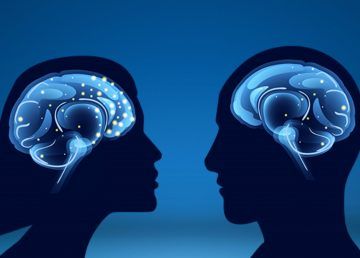 Two months ago I wrote about the gender wage gap in the United States, and the fact that the careers of women vary from men’s in ways which align with the values which women express. Compared with men, women rank helping people higher and maximizing earnings lower. They express less willingness to commit actions which may harm others for the sake of profit. Their tendency to emphasize interpersonal relationships is reflected not only in the paid work they engage in, but also in the greater likelihood that they will reduce or exit employment to care for children or other family members.
Two months ago I wrote about the gender wage gap in the United States, and the fact that the careers of women vary from men’s in ways which align with the values which women express. Compared with men, women rank helping people higher and maximizing earnings lower. They express less willingness to commit actions which may harm others for the sake of profit. Their tendency to emphasize interpersonal relationships is reflected not only in the paid work they engage in, but also in the greater likelihood that they will reduce or exit employment to care for children or other family members.
While writing the piece I read a great deal of online commentary. There was the occasional nod towards the possibility that biology had something to do with the different inclinations on which men and women were acting. Far more common, though, were the explanations which pointed to women’s actions being steered by extrinsic forces – “social norms and expectations” that women will care for family members, “multitude of messages that women get from society about what sorts of jobs they should pick,” “the way that society views the bond between mothers and their children,” “unique socialization histories which instill more negative reactions to ethical compromises,” “persistence of stereotypes that drive women toward service labor.”
The emphasis on expectations and socialization over biology is hardly surprising. As the sociologists Shannon Davis and Barbara Risman write in their article “Feminists wrestle with testosterone: Hormones, socialization and cultural interactionism as predictors of women’s gendered selves,” feminists “worry that any nod of the head to biology will backfire.” Still, the conclusion of Davis and Risman’s own study was that both culture and biology (specifically exposure to prenatal hormones) influenced the degree to which women’s personalities evidenced “masculinity” or “femininity” (the latter of which the researchers suggest might better be called “nurturance and empathy”). There is no logical reason, Davis and Risman write, that feminists should deny that biology “shapes some part of our personality structure,” but neither should that justify “providing differential opportunities, constraints, and privileges to women and men.” Read more »
Women’s Involvement in Slavery in the US
by Adele A Wilby
 Many feminists, and indeed scholars more generally, frequently, and rightly, decry the writing of women out of history. Books such as Cathy Newman’s Bloody Brilliant Women, attempt to redress the historical omission and accord recognition to women who have made major contributions to the progress of humanity. However, while these developments are to be welcomed, it has to be acknowledged that women’s history has its darker side also: women have been complicit in the perpetration of historical wrongs. Sarah Helm’s If This Is A Woman documents the dehumanisation of female prisoners by female guards at the notorious all woman concentration camp at Ravensbrück during World War II; Laura Sjoberg and Caron E. Gentry’s Mothers, Monsters, Whores: Women’s Violence in Global Politics points out the potential of women to support and participate in acts of genocide. And, as Stephanie E. Jones-Rogers’s They Were Her Property: White Women as Slave Owners in the American South informs us, women were deeply involved in another historical wrong: slavery in the United States. Women were, as Jones-Rogers’ says, ‘co-conspirators’ in the institution of slavery in the US, and their involvement constitutes an aspect of the wider history of white supremacist organisations in the US.
Many feminists, and indeed scholars more generally, frequently, and rightly, decry the writing of women out of history. Books such as Cathy Newman’s Bloody Brilliant Women, attempt to redress the historical omission and accord recognition to women who have made major contributions to the progress of humanity. However, while these developments are to be welcomed, it has to be acknowledged that women’s history has its darker side also: women have been complicit in the perpetration of historical wrongs. Sarah Helm’s If This Is A Woman documents the dehumanisation of female prisoners by female guards at the notorious all woman concentration camp at Ravensbrück during World War II; Laura Sjoberg and Caron E. Gentry’s Mothers, Monsters, Whores: Women’s Violence in Global Politics points out the potential of women to support and participate in acts of genocide. And, as Stephanie E. Jones-Rogers’s They Were Her Property: White Women as Slave Owners in the American South informs us, women were deeply involved in another historical wrong: slavery in the United States. Women were, as Jones-Rogers’ says, ‘co-conspirators’ in the institution of slavery in the US, and their involvement constitutes an aspect of the wider history of white supremacist organisations in the US.
Jones-Rogers lays to rest any assumption that the trading and ownership of enslaved human beings in the US was primarily the domain of white men. Indeed, the objective of Jones-Roberts’ book is ‘to focus on women who owned enslaved people in their own right and, in particular, on the experiences of married slave-owning women…the pecuniary ties formed one of slave-owning women’s primary relations to African American bondage’. Thus, women as slave owners challenges our understanding of the gender identity of women, gender power relations and indeed property rights during this period in US history. She reveals just how far the ownership of enslaved people was a source of economic independence and hence power and status for many white women in the family and society, and the creation of such conditions for women frequently began in early childhood. Read more »
Catspeak
by Brooks Riley

What Civility Isn’t
by Scott F. Aikin and Robert B. Talisse
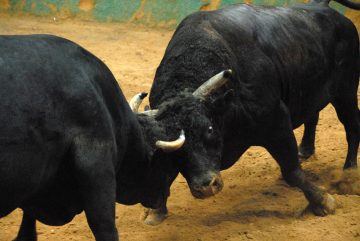
In ordinary contexts, one is said to be civil when one maintains a soft tone and calm manner in the face of opposition. It is consequently seen as uncivil to be uncompromising, trenchant, and exercised in debate. Civility, it seems, is the requirement that disputants adopt a stance towards one another that minimizes the escalation of hostility. The thought is that disagreement tends to be most productive when enacted in cooler temperatures.
Civility in this ordinary sense of the term is something to be commended. When disputes become needlessly heated, they fly off the rails. And when disputes escalate in this way, the problems and questions over which people divide go unaddressed. Incivility leads either to standstills or to circumstances where one side simply imposes its will on the other. Neither makes for healthy relations.
However, when it comes to political disagreements among democratic citizens, ordinary civility presents a puzzle. Although democracy is commonly associated with its most familiar institutional mechanisms such as elections, voting, campaigns, representative offices, and so on, these draw their justification from the deeper moral ideal that democracy serves. This ideal is self-government among social equals. In other words, democracy is the moral proposal that a relatively stable and just political order is possible in the absence of rulers, lords, and bosses. To be sure, all politics involves the exercise of coercive power; however, in sharing political power as equals, democratic citizens are never simply subjected to force. In a democracy, political power is both constrained by constitutional provisions that protect individual rights and accountable to those over whom it is exercised.
At any rate, that’s the ideal of democracy. It goes without saying that real democracies fall far short. Hence the question arises of whether any existing political order is truly democratic. Read more »
Monday Photo
The Intoxicating Radiance of Mr. Sunshine: What Hollywood could learn from a South Korean TV series
by Brooks Riley
 Now that the Emmys are over and we Americans have patted ourselves and a few Brits on the back for outstanding work, it’s time to consider one of the grandest achievements of the past year, a Netflix series from South Korea called Mr. Sunshine, which has, inexplicably, been ignored by media critics in the West.
Now that the Emmys are over and we Americans have patted ourselves and a few Brits on the back for outstanding work, it’s time to consider one of the grandest achievements of the past year, a Netflix series from South Korea called Mr. Sunshine, which has, inexplicably, been ignored by media critics in the West.
Masterpiece Theater meets Gone with the Wind seems a sorry way to try to pigeonhole this epic series and there are those who might want to relegate it to the level of soap opera in costume. Mr. Sunshine is operatic, yes, but there’s not a soap bubble in sight in this multi-faceted, extravagant, scrupulously constructed tale of Korea at the turn of the last century.
I had planned a different essay this time, a critical examination of Nietzsche’s writings on Richard Wagner and was deep into reading and researching for that post when I started Mr. Sunshine. At first, I was able to divide my days between the loquacious, bellicose Mr. N in the morning, and the reticent finesse of a sprawling word-spare historical drama from the Far East at night. As time went on, however, I was lured away from Nietzsche’s late-19th-century twitterstorm, moving deeper into a subtly structured saga set in the Korea of a few years later–its rich, intricate dramaturgy, its attention to detail, its sprawling story, its inspired screenplay. Nietzsche’s infantile trolling of Wagner and counterpunch extolling of Bizet paled against the quiet retributions, political intrigues and slowly unfurling love quadrangle within a roiling cultural and social upheaval on the other side of the globe. Read more »
Tangles
by Shadab Zeest Hashmi
 Oversized photography equipment. Tangled wires.
Oversized photography equipment. Tangled wires.
In a corner, a dusky, crooked mirror.
Ami takes us to the studio for our first passport photos. I am wearing a dress that reminds me of beets for its color and glassy smooth texture. The passport is for a visit to India.
From her purse, ami takes out cash, maybe forty-five rupees for three passport photos and a formal portrait of all three children together.
The rupee coin in India had had Empress Victoria engraved on it for decades by the time my grandparents were born. And around the time my parents were born, the earlier struggle for independence from the British Empire was already becoming the struggle to settle the new nation of Pakistan— the crescent and star newly engraved on the currency. By the year of my own birth, gone was that currency of my parents’ generation, those banknotes with the Bengali script; only Urdu remained— East Pakistan had been split from West Pakistan.
When India was partitioned from Pakistan, my young married aunts had stayed in India while my grandparents migrated with the rest of their children to Dhaka, East Pakistan. It was there my father had attended the American school and prepared for college in the UK, my mother had attended Dhaka University as an exchange student from Lahore, and it was there my parents were engaged.
When another partition was on the horizon, the one between East and West Pakistan, the entire family moved to West Pakistan. In the late sixties, my father returned from London and married my mother in Lahore.
I am negotiating wires and tripods, making my way to the mirror. Read more »
Monday, September 30, 2019
This book should transform your outlook on cancer research
by Ashutosh Jogalekar
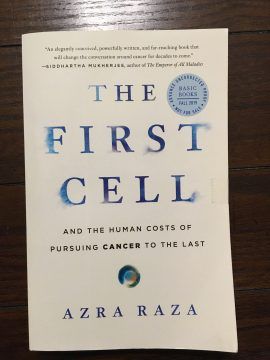 A few days ago I finished watching a new documentary on Bill Gates’ life and work. One of the episodes narrated the sad story of the death of his mother in the mid 1990s from late stage breast cancer. She was a great philanthropist and a doting parent who managed to see Bill get married just before she died. At that point her son was already one of the most successful and wealthiest individuals in the world, but with all his resources and wealth, her life could not be saved. Steve Jobs, another person who had access to every medical treatment that money can buy, died early from cancer. These two stories tell us how great the leveling effect of cancer is, taking poor and rich alike without discrimination. Like war, cancer is the father of us all.
A few days ago I finished watching a new documentary on Bill Gates’ life and work. One of the episodes narrated the sad story of the death of his mother in the mid 1990s from late stage breast cancer. She was a great philanthropist and a doting parent who managed to see Bill get married just before she died. At that point her son was already one of the most successful and wealthiest individuals in the world, but with all his resources and wealth, her life could not be saved. Steve Jobs, another person who had access to every medical treatment that money can buy, died early from cancer. These two stories tell us how great the leveling effect of cancer is, taking poor and rich alike without discrimination. Like war, cancer is the father of us all.
Today breast cancer can be treated much better than it was in the 1990s. There are better drugs and better radiation treatment options available, but for resistant late stage breast cancer the prognosis isn’t much better. In fact, as Dr. Azra Raza who is a distinguished oncologist at Columbia University tells us in this eloquent, thought-provoking and immensely sobering book, what’s true for breast cancer is true for most other kinds of cancer except for a few rare exceptions. The hard hitting truth is that in spite of tens of billions of dollars fueled into research around the world done by some of the smartest people in the field, the truly relevant endpoint for cancer – the increase in someone’s life span – has not changed much even after thirty years. For instance, a study of FDA-approved drugs from 2002 to 2014 showed that these drugs extended people’s lives by an average of only 2 months. Dozens of Nobel Prizes have been given out for basic cancer discoveries, cancer ‘moonshots’ have been promoted by politicians, startups and hospitals working on cancer continue to spend countless dollars and hours on a cure for the disease, but the two things that matter most for patients and their loved ones – extension and quality of life – haven’t changed much.
To know why this depressing scenario persists, Raza offers a simple reason with a hard answer: we are focusing too much on late stage cancer treatment, when the disease has already progressed and spread throughout the body, and much less on early stage detection and prevention. In spite of purported cancer breakthroughs in the media, the treatment is essentially the same as it has been for decades – slash (surgery), poison (chemotherapy) and burn (radiation), a triad of interventions sounding like they have been imported from the Stone Age, used because we can’t use anything better. Read more »
The Cancer Questions Project, Part 9: Ellin Berman
Ellin Berman is a board-certified medical oncologist and hematologist with a clinical and research focus on new drug development in acute and chronic leukemias, including acute myelogenous leukemia (AML) and chronic myelogenous leukemia (CML). As a member of the multidisciplinary Leukemia Disease Management Team at Memorial Sloan Kettering Cancer Center (MSKCC), she works closely with the many individuals who make up the clinical and research programs there. Along with other members of the Leukemia Service, she is involved in clinical trials of new drugs that hopefully will lead to new treatment approaches for these diseases. She has also worked closely with the Food and Drug Administration in this regard, and for the last 20 years have helped review new drug applications for the treatment of leukemia. She is a member of KSKCC’s Institutional Review Board (IRB), the committee that approves, monitors, and reviews research studies at the Center. She is an Associate Editor for the journal Leukemia Research, and reviews articles for a number of other journals including Blood, the Journal of Clinical Oncology, Cancer Research, The Lancet, and the New England Journal of Medicine.
Azra Raza, author of the forthcoming book The First Cell: And the Human Costs of Pursuing Cancer to the Last, oncologist and professor of medicine at Columbia University, and 3QD editor, decided to speak to more than 20 leading cancer investigators and ask each of them the same five questions listed below. She videotaped the interviews and over the next months we will be posting them here one at a time each Monday. Please keep in mind that Azra and the rest of us at 3QD neither endorse nor oppose any of the answers given by the researchers as part of this project. Their views are their own. One can browse all previous interviews here.
1. We were treating acute myeloid leukemia (AML) with 7+3 (7 days of the drug cytosine arabinoside and 3 days of daunomycin) in 1977. We are still doing the same in 2019. What is the best way forward to change it by 2028?
2. There are 3.5 million papers on cancer, 135,000 in 2017 alone. There is a staggering disconnect between great scientific insights and translation to improved therapy. What are we doing wrong?
3. The fact that children respond to the same treatment better than adults seems to suggest that the cancer biology is different and also that the host is different. Since most cancers increase with age, even having good therapy may not matter as the host is decrepit. Solution?
4. You have great knowledge and experience in the field. If you were given limitless resources to plan a cure for cancer, what will you do?
5. Offering patients with advanced stage non-curable cancer, palliative but toxic treatments is a service or disservice in the current therapeutic landscape?
The Beginning of the Beginning: Impeachment in the Air
by Ali Minai
 Sometimes, history moves faster than thought. Something like that is happening in the United States in these early days of fall. Though the season is taking longer than normal to turn, the political season has changed more quickly than anyone expected. The opinions of last week – such as the long article I had written for 3QD on the prospects of Donald Trump and the Democrats in 2020 – have suddenly become irrelevant, and I find myself writing this wholly surprising piece on the possible impeachment of Donald Trump. As these lines are being written, 223 Democrats and one Independent in the US House of Representatives – a clear majority – have announced on the record that they support opening an impeachment process against the President. That number was 120 at the beginning of September, and below hundred just a couple of months ago. We are at a hinge moment in the Trump presidency and in American history.
Sometimes, history moves faster than thought. Something like that is happening in the United States in these early days of fall. Though the season is taking longer than normal to turn, the political season has changed more quickly than anyone expected. The opinions of last week – such as the long article I had written for 3QD on the prospects of Donald Trump and the Democrats in 2020 – have suddenly become irrelevant, and I find myself writing this wholly surprising piece on the possible impeachment of Donald Trump. As these lines are being written, 223 Democrats and one Independent in the US House of Representatives – a clear majority – have announced on the record that they support opening an impeachment process against the President. That number was 120 at the beginning of September, and below hundred just a couple of months ago. We are at a hinge moment in the Trump presidency and in American history.
In critical situations with severely limited options, timing is almost always critical. If a fearsome beast is charging to attack you and you have a single bullet in your gun, when you fire that bullet is as important as whether you aim right. If you fire too soon, the bullet falls to the ground ineffectually and you are at the mercy of the beast, and if you hold your fire too long, the beast will already be upon you. Nancy Pelosi, expert huntress that she is, seems to have got her timing on impeachment exactly right.
The Democratic base has wanted to impeach Donald Trump virtually since the minute he was elected. That fervor persisted as the so-called “Resistance” grew in the wake of the Muslim Ban and other inhumane, ill-advised, and outright cruel Trump Administration policies. However, while the intensity of this fire grew every day, it did not spread beyond the base, and all those who wished to check Trump’s reckless administration came to see winning back the House of Representatives for the Democrats in 2018 as the primary goal. Fed by this passion, the Democrats duly captured the House, decimating the Republicans in cities and suburbs from Wisconsin to Texas. After eight years in the minority, the Democrats were back in charge. Read more »


